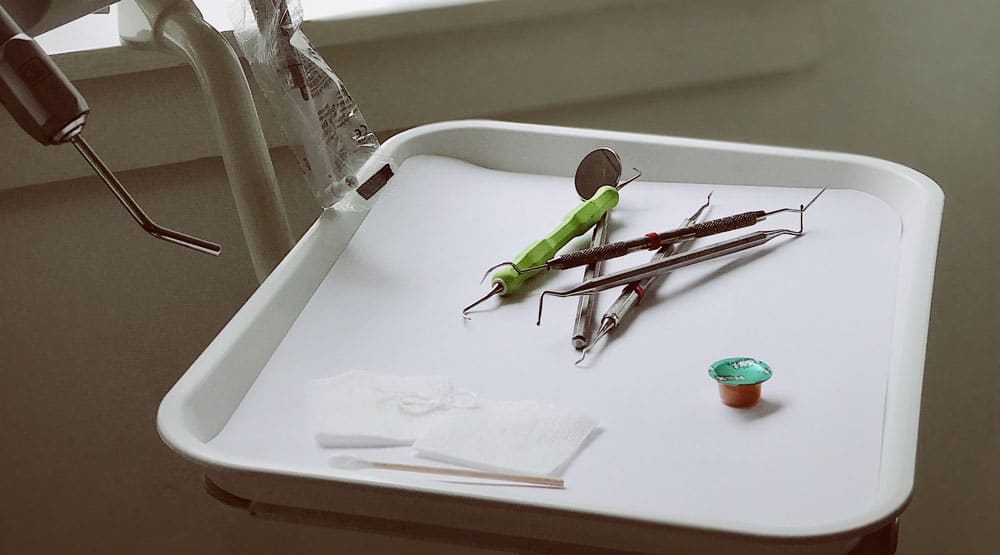Most of us know that our dental health is extremely important because it can affect the rest of our wellbeing. But did you know that dental hygiene can also affect your fertility and ability to get pregnant? The answer is yes, it can.
We have all heard that poor dental health can cause many serious health complications like heart disease, diabetes, stroke. But have you ever heard that not taking proper care of your mouth and teeth can also affect your ability to conceive, or even have a full-term pregnancy?
Increasingly, research is showing that good oral hygiene can improve conception and fertility in both men and women. Similarly, research has also shown that poor oral hygiene and health can negatively affect IVF (in vitro fertilization) treatment.
So, how is it that oral health and hygiene can affect fertility, conception, and pregnancy, you wonder? Well, let’s take a look at the relationship between dental health and fertility both in women and men.
In This Article
Oral hygiene and women’s fertility
There comes a time in a woman’s life when she wants to become a mother. However, recently more and more women are having problems conceiving for various reasons. Many times, stress is said to be one of the main causes of this.
What many fail to see is that there are other equally important causes such as the lack of oral hygiene and thus health. The link between oral health and the chances of getting pregnant is really real.
Poor hygiene and oral health can cause many different problems both in the pre-conception period and even during the pregnancy itself.
Gum disease, also known as periodontitis, is known to prolong the conception time. And during pregnancy, in case you have periodontitis you run the risk of pre-eclampsia, premature birth, and other serious problems.
Most of the problems related to oral health happen due to periodontitis.
Keeping your teeth healthy when trying to conceive and during pregnancy is really important. It can help you save yourself from a lot of headaches.
Oral hygiene and men’s fertility
Men are the focus of a lot more research when it comes to the relationship between oral health and fertility. Compared to women, men are the ones who are likely to have poorer dental hygiene and thus many more fertility-related issues. These issues include erectile dysfunction, low sperm count, etc.
Low sperm count is said to be related to bacterial infection associated with problems with oral health. Similarly, erectile dysfunction is caused by periodontal disease or at least closely related to it.
The reason why sperm is affected by all these dental problems has to do with bacterial infections. Because of bacterial infections which include both periodontitis and tooth decay, the level of bacteria is increased both inside the mouth and everywhere else in the body.
The condition known as bacteriospermia happens due to bacterial infection in semen. Bacteriospermia can affect the normal fertility process – meaning it causes deterioration of spermatogenesis and decreased sperm motility. It’s believed that bacteriospermia can happen due to poor dental hygiene.
There are different ways of dealing with this problem, some of them include treatments of oral problems that can reduce and sometimes even completely get rid of bacteriospermia.
Periodontitis and problems with conception and fertility
Periodontitis or gum disease is the one disease thought to make most of the problems. It happens due to the inflammation of gums, ligaments, and bone surrounding those ligaments. This type of disease is not a rarity and it can develop due to poor oral hygiene and irregular visits and checkup with your dentist.
The first signs of periodontitis are very obvious – your gums become swollen and red, and when brushing your teeth, you’ll notice blood on your toothbrush or sink. However, this can be easily avoided with regular checkups with your dentist. Your dentist will notice the symptoms and treat them early on.
The seriousness of this disease can be seen in the way it affects not just oral health but the health of ovaries, sperm and the ability to conceive. Severe cases of periodontal disease have led to a polycystic ovarian syndrome, which in turn caused difficulties during conception. In men, periodontitis causes erectile dysfunction.
Another problem that can be caused by this disease is the difficulty and failure in the IVF treatment. Periodontitis leads to bacteremia which can then cause complications in conceiving naturally or through IVF in women.
Research has also shown that women with the periodontal disease took longer to conceive naturally compared to women without it.
Pregnant women with this type of gum disease run a higher risk of having a miscarriage or premature birth.
Other dental problems that may affect fertility
Another much more common dental problem is gingivitis. Gingivitis is a milder form of gum inflammation. It usually happens because of increased bacteria and plaque accumulated on your teeth.
Gingivitis is not as serious or as destructive as periodontitis, but if left untreated it can easily lead to periodontal disease.
Some of the symptoms include irritated, red and swollen gums, and even bleeding. However, gingivitis can be easily treated – first make a dental appointment as soon as possible, then after plaque has been removed by your dentist, the rest you can do by yourself.
Find anti-gingivitis toothpaste and brush your teeth and gums for 2 minutes at least. Check your gums often and don’t forget to replace your toothbrush every 3 months.
Smoking is yet another problem that affects fertility and conception. People who smoke run a higher risk of developing periodontal disease and in turn causing problems with fertility.

How to improve your dental hygiene and thus overall health
Whatever is going on in our mouth can very well affect the rest of our body. That’s why if you’re planning to have a baby or if you’re already pregnant, you must take special care of your mouth and its health.
This goes both for men and women, infertility is a serious problem that affects many families. The interesting thing is that this problem with fertility and conception can be easily avoided or even prevented. All you have to do is give your oral health a bit of attention.
Here are some of the ways which can help you improve your dental health.
Brush your teeth and clean your tongue regularly
Brushing your teeth after every meal is important no matter what anyone says. After each meal the amount of bacteria and plaque in our mouth increases. This increased amount of bacteria can cause serious problems later on – meaning it can even cause infertility.
For this reason alone, brushing your teeth after each meal should be a priority. If you are outside your home, carry a toothbrush and paste with you. However, if you aren’t able to brush your teeth right after a meal, at least rinse with water.
And what about our tongues? They too are part of our mouth and cleaning them is just as important. The surface of the tongue can accumulate bacteria too – meaning periodontal pathogens. Those pathogens can easily move to your teeth and cause big problems.
A tongue cleaner is a device designed to clean the surface of our tongues. Tongue cleaners are better for cleaning your tongues than toothbrushes because they are specially designed in accordance with the anatomy of the tongue.
The combination of brushing your teeth and cleaning your tongue regularly can help you prevent so many health problems, including infertility.
Floss!
Another important component when it comes to maintaining your dental hygiene is flossing. Gingivitis and periodontitis attack gums. This is why taking care of your gums is as equally important as cleaning your teeth and tongue.
Food can get stuck pretty much anywhere in our mouth, causing the increase of bacteria and plaque. Brushing your teeth can only clean your mouth and teeth partially. Flossing can access the spaces between your teeth which a regular toothbrush can’t.
That’s why flossing regularly is a requirement if you want to keep your oral cavity healthy and clean. However, just flossing isn’t enough if you have already developed gum disease. If that is your case, our recommendation would be to visit your dentist as soon as possible. There, you will be instructed about what to do next.
Your dentist may tell you to start using interdental brushes or they will instruct you how to use floss properly in order to avoid the inflammation of gums in the future.
Use mouthwash
Mouthwash is used for disinfecting the inside of our oral cavity. It’s a good way to refresh your breath, but it shouldn’t, in any case, replace teeth brushing. This is because mouthwashes are only effective on the surface of your teeth, they don’t perform deeper cleaning.
You can wash your mouth with mouthwash between teeth brushing or when there is no time to brush your teeth after a meal outside.
Using mouthwash is not necessary, but it can help maintain your dental health together with teeth brushing and tongue cleaning.
Don’t skip dentist appointments
The fear of dentists is real, and many people hate going to dental appointments. However, there is nothing to fear, especially if the dentist can help you out with so much.
Many dental problems happen suddenly and silently without you even realizing it. That’s why regular visits to your dentist are absolutely necessary. For example, according to many dentists, treating periodontal disease isn’t difficult but only if you go regularly to your dentist. By not going, you risk creating more serious problems to your health and to yourself.
Another problem that can’t be solved with just tooth brushing is the cavity. The cavity is yet another reason to visit your dentist asap. Fixing those cavities should be a priority because tooth decay can also cause many different health problems.
Visiting your dentist every six months is recommended to everyone, and if you’re trying to conceive or if you’re already pregnant those visits should be more frequent.
Schedule other kinds of checkups
Checking your blood or doing preliminary fertility tests is also very important. By checking your blood regularly, you will be able to see if there is any problem that needs to be taken care of.
And how would you know that from just a blood analysis? Well, in case your white cell count is higher than normal it may point to an infection that can very well be caused by the bacteria in your mouth. And as we mentioned above, the infection can cause bacteriospermia, which can then cause the low sperm count.
Doing fertility tests is also important when you’re trying to get pregnant. These tests can help you figure out if there is any problem and if there is how to deal with it.
As you can see, a lot can be done to solve the problem if there is any. All you have to do is start on time.
Quit smoking
We all know smoking is bad for so many reasons, yet smoking is still one of our guilty pleasures. However, if you really want to have a child, smoking must stop.
Smoking can cause many oral problems that can increase the risk of infertility. Smoking is just one of the causes of periodontal disease that is, as we have seen, one of the major causes of problems with fertility, conception and even pregnancy.
Apart from being bad for our overall health, smoking increases the chances of us not being able to have a family. So, let’s make a commitment to quit smoking right now.
How strange is it that just the lack of oral hygiene can cause so many problems? Unfortunately, it can. The good thing is that it has a solution and a pretty easy one at that.
By improving your oral hygiene, you can solve so many health problems, including infertility. Visit your dentist as often as you can, brush, floss and rinse your teeth and clean your tongue regularly.
Good oral hygiene can give us bright white smiles and great overall health! Plus, there will be more babies!









![Home Renovation Guide [2025]](/app/uploads/2021/04/design-hacks-1-378x300.jpg)
